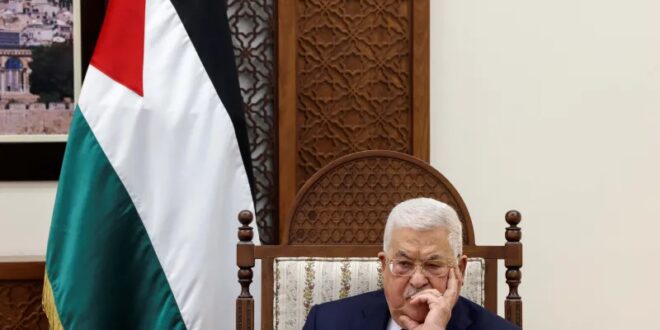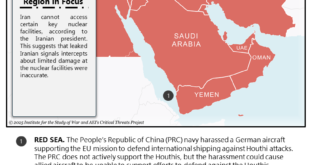A Contest to Succeed President Abbas Could Destabilize the Region
In 2005, Mahmoud Abbas was elected to a four-year term as president of the Palestinian Authority, filling the vacancy left by the death of Yasir Arafat. Since then, there have been no elections; 18 years later, Abbas is still in office.
The PA was established by a 1994 agreement between Israel and the Palestine Liberation Organization. Although legally subordinate to the PLO, with powers limited to the West Bank and Gaza, the PA swiftly became the center of gravity in the Palestinian political system. The authority’s structure was modeled on the governments of Egypt, Syria, and Tunisia, with a theoretical separation of powers between the legislature (the Palestinian Legislative Council), the judiciary, and the executive. In reality, the presidency dominates the other two branches of government. The courts are submissive, and Abbas controls the legislature, and has the power to appoint and dismiss the prime minister. He is also in charge of the security services, and as Arafat did before him, Abbas serves simultaneously as president of the authority, chairman of the PLO and head of the Fatah party, controlling its votes in the legislature. Although the authority’s popularity is waning, it is still the governing body of the West Bank, the international voice for Palestinians, and the bastion of secular national Palestinian politics. Abbas’s various roles have made him the focal point of Palestinian power.
The PA’s main competitor has long been Hamas, which was established in 1987. Hamas is an Islamist organization that is fiercely anti-Israeli, regarding any peace with the occupier as illegitimate. It uses violence as a tool to achieve its objectives and is regarded as a terrorist organization by many Arab and Western countries, including the United States.
The authority is highly unpopular, and Abbas is now 87. Mutterings about succession have grown louder with each passing year. When the time comes for the selection of a new president, it is unlikely to be a smooth transition; Abbas has maintained his grip on power by ensuring that he has no obvious successor and by refusing to create a process for selecting one. This means that in the event of his death or sudden decision to step down, a protracted and violent struggle is likely to result. Such a conflict could decide not only who governs the PA and whether it survives as a governing body but also the future of the Palestinian national movement.
COLLAPSING AUTHORITY
The Palestinian Authority was intended to be an interim step toward the founding of a sovereign Palestinian state, which the United States hoped would follow from a diplomatic deal to end the Israeli occupation. But this deal never came, and as the peace process began to falter in the late 1990s, the PA became practically permanent. It quickly grew into a bloated, unresponsive institution that seemed more interested in providing patronage to its cronies than in governing. Within a few years of its establishment, many Palestinians associated the authority with corruption, nepotism, and inefficiency.
Although these trends began well before the 2005 election, they accelerated under Abbas’s leadership. His failure to negotiate an end to the Israeli occupation was particularly damaging to the PA’s standing. By 2010, the Palestinian public had lost faith in diplomacy. In 2011, Abbas—who favors negotiations and generally opposes violence—sought an alternative path to a settlement with Israel by applying to join the United Nations. This effort backfired when the bid failed. The Palestinians did succeed in joining some UN agencies, including the International Civil Aviation Organization, UNESCO, and the International Criminal Court. But this made little tangible difference in Palestinians’ lives. In the meantime, the rightward shift in Israeli politics worsened relations and rendered any form of PA cooperation with Israel, particularly in the realm of security, highly unpopular. Today, the authority still espouses diplomacy and calls for negotiations. But according to a poll conducted in March by the Palestinian Center for Policy and Survey Research, only 18 percent of Palestinians believe that negotiations are the the best route to ending the occupation, and 69 percent doubt that international organizations will be able to soften Israeli policies.
The authority has also struggled domestically. In 2006, in a bid to bolster his legitimacy, Abbas called Palestinian Legislative Council elections. Hamas ran a campaign focused on the PA’s corruption and won 74 seats; Abbas’s Fatah won just 45. Attempts to negotiate a power-sharing agreement proved unsuccessful, and violence broke out. Armed partisans clashed, culminating in a showdown in the Gaza Strip in 2007 in which hundreds were killed and wounded. Hamas won, drove the authority out and took over the territory. Israel responded by imposing a blockade on Gaza, leaving Palestinians geographically and politically divided, with the PA continuing to rule in the West Bank.
These events rocked the authority, and in an attempt to rehabilitate its standing, Abbas appointed a reformist prime minster, Salam Fayyad. Fayyad’s tenure was short. He was ousted in 2013, brought down by fierce opposition from Fatah leaders to his anticorruption measures. Since then, Fayyad’s reforms to reduce corruption and increase financial transparency and public-sector efficiency have been rolled back. Today, around 80 percent of Palestinians believe that the PA is corrupt, and an opinion survey conducted by the pollster Khalil Shikaki in April showed that for the first time, a majority of Palestinians believe that the collapse of the authority would be in their best interests.
UNEASY LIES THE HEAD
Popular dissatisfaction with the authority intensified after it began to take an increasingly authoritarian turn. The PA, like the Arab governments it modeled itself on, was never democratic. Yet starting with attempts to deny Hamas the ability to govern after its 2007 parliamentary victory, Abbas abandoned all remaining checks and balances in favor of concentrating power in his hands. He brought the judiciary under his control, culminating in a 2016 presidential decree that created the Palestinian Constitutional Court, which was designed to give a veneer of legality to his decisions. Abbas packed the court with loyalists, and it began to rule in his favor, approving his decision to postpone national and municipal elections. Two years later, the court dissolved the legislative council.
Although these institutions were never truly independent, Abbas’s power grab was nonetheless significant. His predecessor was by no means a democrat. But Arafat had a consensus-building approach to politics, permitting criticism, largely preferring cooperation to confrontation, and encouraging a measure of vibrancy within Fatah that attracted young, energetic political talent. As a result, when Arafat died, the transition was smooth. Abbas, in contrast, regards any expression of disagreement as a challenge and is fearful of attracting talent into the party lest it question his policies and decisions.
Although this approach has brought Fatah firmly under his control, the party’s base has narrowed and its appeal to young politically minded Palestinians has diminished. Abbas has dealt swiftly with party figures who have attempted to build a political base or who have become too popular. In 2016, for example, he used Fatah’s General Conference to marginalize the popular party officials Marwan Barghouthi and Muhammad Dahlan. Others have been expelled for defying his orders. The marginalizations and expulsions have left the party short on talent, featuring many aspirants to the throne but none who poses a serious challenge.
Nevertheless, with Abbas’s advancing age, figures across party and government are carefully beginning to position themselves for when the time comes. Hussein al-Sheikh, the secretary-general of the PLO, and Majed Faraj, the security chief of the PA, are currently using their proximity to Abbas to position themselves to take over. Both al-Sheikh and Faraj, however, have no political base and are regarded by traditional Fatah leaders as upstarts whose prominence owes everything to Abbas’s support and little to their popular base or party credentials. Other candidates include Jibril Rajoub, who has skillfully used his position as head of the Palestinian Football Association to build support, and Mahmoud al-Aloul, Fatah’s vice president and a popular figure among the party’s older generation. Rajoub and Aloul may enjoy support within Fatah, but they are not PA officials. This means that in the event of a contest for the succession, they will not have access to the government resources necessary to bully or bribe supporters.
When Abbas exits the scene, it will be a moment of real danger for the authority.
Other aspirants are playing a different game, seeking to remain above the fray so that once the main candidates have torn each other apart, they can emerge as consensus candidates. These include the authority’s prime minister, Mohammad Shtayyeh, and former foreign minister, Nasser al-Qudwa. Other figures, conscious that they cannot win, are positioning themselves as kingmakers, most notably Dahlan, the exiled Fatah leader.
When Abbas exits the scene, it will be a moment of real danger for the authority. It is deeply unpopular, with 63 percent of Palestinians identifying it as a burden rather than an asset, according to the Palestinian Center for Policy and Survey Research poll conducted in March. The PA’s position is further imperiled by the deteriorating security situation in the West Bank, where local militant groups in Nablus, Jenin, and other cities are emerging to fill the vacuum created by the authority’s weakness. Hamas is also working to destabilize the PA by highlighting the authority’s corruption and ineptitude and by conducting terror attacks against Israel to provoke Israeli reprisals against it.
Whether the succession is swift or protracted, orderly or disorderly, it will be a dangerous moment. In the absence of a central political and security authority, local dynamics will assert themselves. Local leaders such as Rajoub in Hebron and al-Sheikh and Faraj in Ramallah may hold sway based on purely local considerations. Hamas, which has not so far politically asserted itself in the West Bank, may decide to act in areas where it has popular support by backing local leaders sympathetic to its goals.
A disorderly transition would be particularly destabilizing. A drawn-out succession process could easily lead to violence, a prospect made more dangerous by the abundance of small arms in the West Bank. If violence were to erupt, it would inevitably target Israeli occupying forces, drawing an Israeli response. To guard against such developments, Israel will inevitably intervene militarily, and local Palestinian leaders might in turn adopt a confrontational approach to Israel to enhance their local legitimacy. This would further damage a successor’s ability to govern.
FAIL TO PREPARE, PREPARE TO FAIL
A stable succession cannot be ensured once the process is in full swing. In the heat of the moment, the stakes will be too high for the competitors to be expected to cooperate. The process must begin now, while Abbas is still strong enough to shape it. He does not need to choose a successor. Instead, he need only create the process and rules for identifying and selecting capable leaders. Expecting such a process to be fully democratic may be a step too far, given the split between Fatah and Hamas and the increasingly fragmented nature of Palestinian politics. But revitalizing Fatah’s ability to produce credible leaders could at least stabilize the succession process. This will mean readmitting expelled or alienated leaders to Fatah and allowing for open competition within the movement. The process for calling a Fatah general conference in which leaders with genuine constituencies can emerge must be established, too.
Abbas is unlikely to take those steps himself, which would run contrary to his leadership style. It should instead be established by the United States, which remains the only international actor with enough diplomatic heft to assemble a coalition of European and regional leaders capable of applying concerted pressure on Abbas. Although Washington should kick-start and lead this process, it should not oversee it directly. The United States should instead work in partnership with its Arab allies, who understand Palestinian politics and know all the players.
The creation of such a process will not be easy. But if it is not established now, the likely result will be instability and even the potential collapse of the authority after Abbas exits the scene. If that happens, the impact could be catastrophic for the region. Violence could spill over from the Palestinian territories to Israel and possibly even Jordan. This would drag the United States back into an Israeli-Palestinian conflict, even as its attention and resources are focused elsewhere. At a time when U.S. influence in the region seems to be waning, paving the way for a stable PA succession is one way in which Washington can demonstrate that it is still able to make a positive difference.
 Eurasia Press & News
Eurasia Press & News



